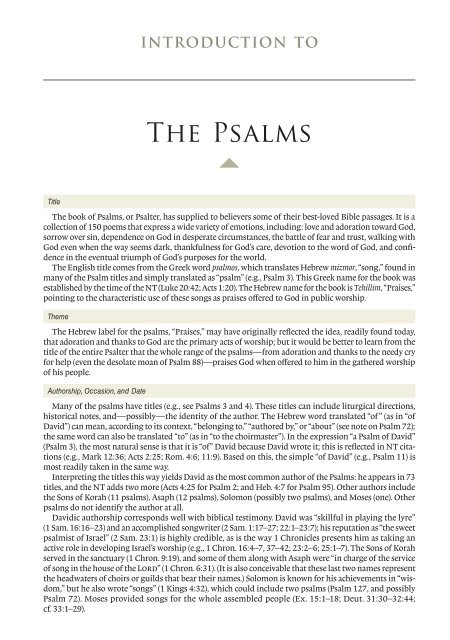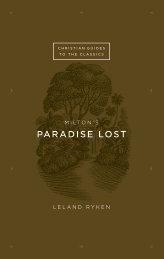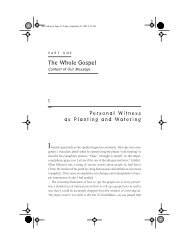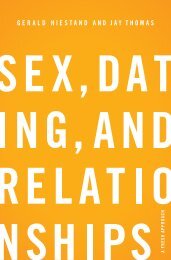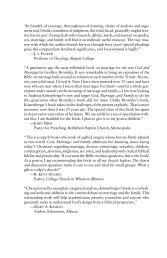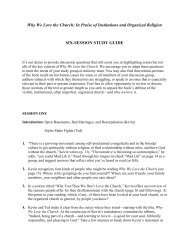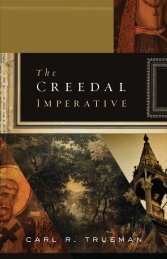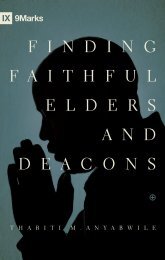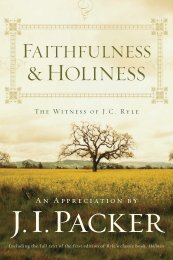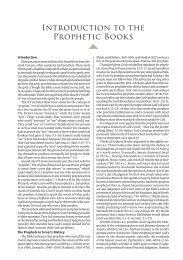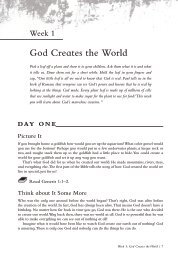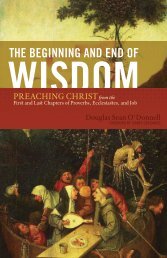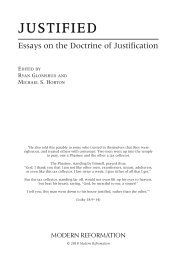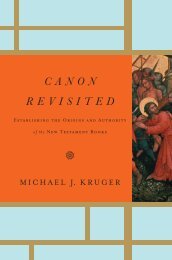ESV Study Bible Sample (Psalms) - Monergism Books
ESV Study Bible Sample (Psalms) - Monergism Books
ESV Study Bible Sample (Psalms) - Monergism Books
- No tags were found...
Create successful ePaper yourself
Turn your PDF publications into a flip-book with our unique Google optimized e-Paper software.
Introduction ToThe <strong>Psalms</strong>TitleThe book of <strong>Psalms</strong>, or Psalter, has supplied to believers some of their best-loved <strong>Bible</strong> passages. It is acollection of 150 poems that express a wide variety of emotions, including: love and adoration toward God,sorrow over sin, dependence on God in desperate circumstances, the battle of fear and trust, walking withGod even when the way seems dark, thankfulness for God’s care, devotion to the word of God, and confidencein the eventual triumph of God’s purposes for the world.The English title comes from the Greek word psalmos, which translates Hebrew mizmor, “song,” found inmany of the Psalm titles and simply translated as “psalm” (e.g., Psalm 3). This Greek name for the book wasestablished by the time of the NT (Luke 20:42; Acts 1:20). The Hebrew name for the book is Tehillim, “Praises,”pointing to the characteristic use of these songs as praises offered to God in public worship.ThemeThe Hebrew label for the psalms, “Praises,” may have originally reflected the idea, readily found today,that adoration and thanks to God are the primary acts of worship; but it would be better to learn from thetitle of the entire Psalter that the whole range of the psalms—from adoration and thanks to the needy cryfor help (even the desolate moan of Psalm 88)—praises God when offered to him in the gathered worshipof his people.Authorship, Occasion, and DateMany of the psalms have titles (e.g., see <strong>Psalms</strong> 3 and 4). These titles can include liturgical directions,historical notes, and—possibly—the identity of the author. The Hebrew word translated “of ” (as in “ofDavid”) can mean, according to its context, “belonging to,” “authored by,” or “about” (see note on Psalm 72);the same word can also be translated “to” (as in “to the choirmaster”). In the expression “a Psalm of David”(Psalm 3), the most natural sense is that it is “of” David because David wrote it; this is reflected in NT citations(e.g., Mark 12:36; Acts 2:25; Rom. 4:6; 11:9). Based on this, the simple “of David” (e.g., Psalm 11) ismost readily taken in the same way.Interpreting the titles this way yields David as the most common author of the <strong>Psalms</strong>: he appears in 73titles, and the NT adds two more (Acts 4:25 for Psalm 2; and Heb. 4:7 for Psalm 95). Other authors includethe Sons of Korah (11 psalms), Asaph (12 psalms), Solomon (possibly two psalms), and Moses (one). Otherpsalms do not identify the author at all.Davidic authorship corresponds well with biblical testimony. David was “skillful in playing the lyre”(1 Sam. 16:16–23) and an accomplished songwriter (2 Sam. 1:17–27; 22:1–23:7); his reputation as “the sweetpsalmist of Israel” (2 Sam. 23:1) is highly credible, as is the way 1 Chronicles presents him as taking anactive role in developing Israel’s worship (e.g., 1 Chron. 16:4–7, 37–42; 23:2–6; 25:1–7). The Sons of Korahserved in the sanctuary (1 Chron. 9:19), and some of them along with Asaph were “in charge of the serviceof song in the house of the Lord” (1 Chron. 6:31). (It is also conceivable that these last two names representthe headwaters of choirs or guilds that bear their names.) Solomon is known for his achievements in “wisdom,”but he also wrote “songs” (1 Kings 4:32), which could include two psalms (Psalm 127, and possiblyPsalm 72). Moses provided songs for the whole assembled people (Ex. 15:1–18; Deut. 31:30–32:44;cf. 33:1–29).
Introduction to The <strong>Psalms</strong>936By the end of the nineteenth century, many scholars had concluded that the titles in <strong>Psalms</strong> had little orno validity; some of their strongest arguments involved the presence of words and phrases in the psalmsthat look more at home in later Hebrew or even Aramaic than in standard biblical Hebrew; this wouldimply that the psalms as they exist today come from the first few centuries b.c. But the discovery of moreancient Near Eastern writings since that time has made it possible to give a fuller history of the Hebrewlanguage and a fuller appreciation of ancient literary conventions, and it is now harder to sustain thesearguments for late dating. Many scholars will now allow that quite a few of the psalms come from beforethe Babylonian exile. Coupled with the apparent antiquity of the authorship inscriptions, this provides agood reason for taking these inscriptions at face value. The NT authors accept David as author of the psalmsattributed to him (e.g., Mark 12:36; Acts 1:16; 2:25; Rom. 4:6; 11:9), and sometimes the characters in a storymake David’s authorship a key part of their case (e.g., Luke 20:42; Acts 2:29, 34; 13:36–39). (For the questionof what use to make of the authorship, esp. of David, see The <strong>Psalms</strong> as Scripture.)Fourteen of the Davidic psalms add further information in their titles, connecting the psalm to a specificincident in David’s life (see chart below). It is often said that they are later additions to the psalms, since theynarrate events in the third person (while the psalm is in the first person). Some wonder as well whether suchpolished productions (e.g., Psalm 34) could have arisen from the circumstances described in the title. Inreply, there is no reason why an author cannot narrate about himself in the third person (e.g., Isa. 20:2; Jer.20:1–2; 21:1–3; 26:1–24; Hos. 1:2–6; etc.); further, the titles do not imply that David composed the psalm atthe time of the event, only that the event led to the psalm. The fact that two of the titles cannot be correlatedwith anything in 1–2 Samuel argues against the idea that a later editor added these titles after carefullyexamining biblical texts. Finally, this historical information often lends help to both interpreting the psalmand discerning how it should be applied. Therefore the notes that follow employ this information.A few of the psalms seem originally to have been written for a particular occasion, and the individualexpositions will discuss that possibility (e.g., <strong>Psalms</strong> 24; 68; 118). Perhaps they came to be used in specificfestivals in order to commemorate the original events. Some scholars have suggested that the liturgicalcalendar found in Leviticus is a late invention, and that the early period of Israel (when some of the psalmswere first written) had annual festivals analogous to those found in other cultures; hence they tried toassociate particular psalms with places in these hypothetical festivals. The evidence for such a constructionis poor, and many today try to connect various psalms with the biblical festivals. One difficulty with this isthat there is so little information in the OT itself about how many aspects of the worship were conducted.In addition to the festivals, Leviticus 23:3 sets the weekly Sabbath as a day of “holy convocation.” It is unclearwhat kind of meeting is expected in the villages week by week, but it seems to be some kind of worship.Therefore, while it seems true that some psalms are intended for particular festivals or celebrations (e.g.,Psalm 65 as a harvest thanksgiving), it also is clear that many psalms are suitable year round, and could beused as needed; indeed, Psalm 92 is a thanksgiving for the weekly Sabbath worship.********CHART 1***Psalm Incident References3 David flees from and battles Absalom 2 Samuel 15–177 The words of Cush, a Benjaminite (persecution by Saul?) unknown18 David delivered from enemies and from Saul 2 Samuel 2230 Dedication of the temple Nothing in David’s life; cf. 1 Kings 8:6334 David delivered from danger by feigning madness in the presence of King Achish of Gath 1 Sam. 21:12–22:151 Nathan confronts David about his adultery with Bathsheba 2 Samuel 11–1252 Doeg the Edomite tells Saul that David went to the house of Ahimelech 1 Sam. 22:9–1954 The Ziphites tell Saul that David is hiding among them 1 Sam. 23:1956 The Philistines seize David in Gath 1 Sam. 21:10–1157 David flees from Saul into a cave 1 Sam. 22:1 or 24:359 Saul sends men to watch David’s house in order to kill him 1 Sam. 19:1160 David’s victory over Transjordan 2 Sam. 8:1–1463 David in the desert of Judah 2 Samuel 15–17?; 1 Sam. 23:14–15?142 David flees from Saul into a cave Same as Psalm 57
937 Introduction to The <strong>Psalms</strong>The individual psalms come from diverse periods of Israel’s history: from the time of Moses (15th or13th century b.c.), to that of David and Solomon (10th century), down to exilic and postexilic times (e.g.,Psalm 137). A number of factors clearly indicate that the book of <strong>Psalms</strong> in its present form is the productof a process of collecting (and possibly of editing) from a variety of sources; such factors include:• The division into five books and the affinity groupings, e.g., <strong>Psalms</strong> 1–2; 113–118 (the Egyptian Hallel;see notes on <strong>Psalms</strong> 113–118); <strong>Psalms</strong> 120–134 (the Songs of Ascents); and the final Hallelujah of<strong>Psalms</strong> 146–150 (see discussion of Structure);• the existence of the almost identical <strong>Psalms</strong> 14 and 53;• the notice in 72:20 about the end of David’s prayers (while there are still plenty of Davidic psalms tofollow).There is no way to tell what kind of editing the collectors might have done as they incorporated a compositioninto the developing Psalter; recognized scribal practices include minor things like updating spellingand grammar, and clarifying place names. If the regard for an author’s inspiration was as high as it shouldhave been (1 Chron. 25:1–5 describes some of the psalmists as “prophesying” and as “seers,” which meansthey convey God’s own words), then it is unlikely that the editors went much beyond the recognized scribalpractices. It is likely that many of the psalms began as intensely personal poems, which were then adaptedfor congregational use (e.g., see note on Psalm 51), possibly even by the original author. It is also likely thatsome psalms were composed by stitching together preexisting material (e.g., Psalm 108); but, for the faithful,it is the final form that is canonical, and that is the focus of these notes.It appears that at every stage of this editorial process, the Psalter served as the songbook of the worshipingpeople of God.Key ThemesThe Psalter is fundamentally the hymnbook of the people of God at worship. The <strong>Psalms</strong> take the basicthemes of OT theology and turn them into song. Thus, themes common throughout the OT (see pp. ****–****)reappear in the <strong>Psalms</strong> and include the following:1. Monotheism. The one true God, maker of heaven and earth and ruler of all things, will vindicate hisown goodness and justice, in his own time. Every human being must know and love this God, whose spotlessmoral purity, magnificent power and wisdom, steadfast faithfulness, and unceasing love are breathtakinglybeautiful.2. Creation and fall. Though God made man with dignity and purpose, all people since the fall are besetwith sins and weaknesses that only God’s grace can heal.3. Election and covenant. The one true God chose a people for himself and bound himself to them by hiscovenant. This covenant expressed God’s intention to save the people, and through them to bring light tothe rest of the world.4. Covenant membership. In his covenant, God offers his grace to his people: the forgiveness of their sins,the shaping of their lives in this world to reflect his own glory, and a part to play in bringing light to theGentiles. Each member of God’s people is responsible to lay hold of this grace from the heart: to believe thepromises, to grow in obeying the commands, and to keep on doing so all their lives long. Those who layhold in this way are the faithful, as distinct from the unfaithful among God’s people; they enjoy the fullbenefits of God’s love, and they find boundless delight in knowing God. Each of the faithful is a memberof a people, a corporate entity; the members have a mutual participation in the life of the whole people.Therefore the spiritual and moral well-being of the whole affects the well-being of each of the members,and each member contributes to the others by his own spiritual and moral life. Thus each one shares thejoys and sorrows of the others, and of the whole. The faithful will suffer in this life, often at the hands ofthe unfaithful, and sometimes from those outside God’s people. The right response to this suffering is notpersonal revenge but believing prayer, confident that God will make all things right in his own time.5. Eschatology. The story of God’s people is headed toward a glorious future, in which all kinds of peoplewill come to know the Lord and join his people. It is part of the dignity of God’s people that, in God’s mysteriouswisdom, their personal faithfulness contributes to the story getting to its goal. The Messiah, theultimate heir of David, will lead his people in the great task of bringing light to the Gentiles.
Introduction to The <strong>Psalms</strong>938History of Salvation SummaryThroughout history God has been fashioning a people for himself who will love and obey him, and whowill express and nourish their corporate life in gathered worship. The <strong>Psalms</strong> served as a vehicle for theprayers and praises of God’s people in Israel, and Christians today, who have been grafted into the olive treeof God’s ancient people (Rom. 11:17, 24), can join their voices together with these ancient people in theirworship. There are indeed adjustments to be made, now that Jesus has died and risen (see The <strong>Psalms</strong> asScripture), and yet Gentile believers in Jesus may rejoice with the people of God of all ages. (For an explanationof the “History of Salvation,” see the Overview of the <strong>Bible</strong>, pp. ****–****. See also History of Salvationin the Old Testament: Preparing the Way for Christ, pp. ****–****.)Musical TermsThere are several Hebrew words and phrases in the <strong>Psalms</strong>, such as “Selah” (e.g., 3:2), “The Sheminith”(Psalm 6 title), “Shiggaion” (Psalm 7 title), whose exact meaning is uncertain—which is why the translatorshave simply transliterated them, as any attempt to translate would be misleading. The esv footnotes indicatethat these are probably terms for musical or liturgical direction. (Cf. how <strong>Psalms</strong> 4 and 5 refer to musicalinstruments in their titles.) In some cases these may be things like names of tunes or chant styles (see noteon “Do not destroy” in Psalm 57 title).Curses in the <strong>Psalms</strong>Many psalms call on God for help as the faithful are threatened with harm from enemies (often called “thewicked”—frequently the unfaithful who persecute the godly, and sometimes Gentile oppressors). In a numberof places, the requested help is that God would punish these enemies. Christians, with the teaching andexample of Jesus (in passages like Matt. 5:38–48; Luke 23:34; 1 Pet. 2:19–23; cf. Acts 7:6), may wonder whatto make of such curses: How can it possibly be right for God’s people to pray in this way? Many have supposedthat this is an area in which the ethics of the NT improve upon and supersede the OT. Others suggestthat these only apply to the church’s warfare with its ultimate enemy, Satan, and his demons. Neither of theseis fully satisfying, both because the NT authors portray themselves as heirs of OT ethics (cf. Matt. 22:34–40)and because the NT has some curses of its own (e.g., 1 Cor. 16:22; Gal. 1:8–9; Rev. 6:9–10), even findinginstruction in some of the <strong>Psalms</strong>’ curses (e.g., Acts 1:20 and Rom. 11:9–10, using <strong>Psalms</strong> 69 and 109). Eachof the psalm passages must be taken on its own, and the notes address these questions (e.g., see notes on5:10; 35:4–8; 58:6–9; 59:11–17; 69:22–28; 109:6–20; and the note on Psalm 137, which contains the moststriking curse of all). At the same time, some general principles will help in understanding these passages.First, one must be clear that the people being cursed are not enemies over trivial matters; they are peoplewho hate the faithful precisely for their faith; they mock God and use ruthless and deceitful means to suppressthe godly (cf. 5:4–6, 9–10; 10:15; 42:3; 94:2–7).Second, it is worth remembering that these curses are in poetic form, and can employ extravagant andvigorous expressions. (The exact fulfillment is left to God.)Third, these curses are expressions of moral indignation, not of personal vengeance. For someone whoknows God, it is unbearably wrong that those who persecute the faithful and turn people away from Godshould get away with it, and even seem to prosper. Zion is the city of God, the focus of his affection (cf. <strong>Psalms</strong>48; 122), and it is unthinkable that God himself could tolerate cruel men taking delight in destroying it.Thus these psalms are prayers for God to vindicate himself, displaying his righteousness for all the worldto see (cf. 10:17–18). Further, these are prayers that God will do what he said he will do: 35:5 looks back to1:4, and even 137:9 has Isaiah 13:16 as its backdrop. Most of these prayers assume that the persecutorswill not repent; however, in one place (Ps. 83:17), the prayer actually looks to the punishment as leadingto their conversion.Fourth, the OT ethical system forbids personal revenge (e.g., Lev. 19:17–18; Prov. 24:17; 25:21–22), a prohibitionthat the NT inherits (cf. Rom. 12:19–21).Thus, when the NT writers employ these curses or formulate their own (as above), they are following theOT guidelines. Any prayer for the Lord to hasten his coming must mean disaster for the impenitent (2 Thess.1:5–10). Yet Christians must keep as their deepest desire, even for those who mean harm to the church, thatothers would come to trust in Christ and love his people (cf. Luke 23:34; Rom. 9:1–3; 10:1; 1 Tim. 2:4; 2 Pet.3:9). Hence, when they pray for God to protect his people against their persecutors, they should be explicitabout asking God to lead such people to repentance. With these things in mind, then, it is still possible thatthe faithful today might sing or read aloud even these sections of the <strong>Psalms</strong>.
939 Introduction to The <strong>Psalms</strong>The <strong>Psalms</strong> as ScriptureThe OT certainly presents the <strong>Psalms</strong> as part of God’s inspired Word: 1 Chronicles 25:1–6 says that anumber of sanctuary personnel “prophesied,” and that one was a “seer” (a synonym for “prophet”). Some ofthese men appear as authors of canonical psalms. It is important to clarify just how the psalms are to functionfor the people of God.Their primary function has already been mentioned: the Psalter is the songbook of the people of God intheir gathered worship. These songs cover a wide range of experiences and emotions, and give God’s peoplethe words to express these emotions and to bring these experiences before God. At the same time, the psalmsdo not simply express emotions: when sung in faith, they actually shape the emotions of the godly. The emotionsare therefore not a problem to be solved but are part of the raw material of now-fallen humanity thatcan be shaped to good and noble ends. The psalms, as songs, act deeply on the emotions, for the good of hispeople. It is not “natural” to trust God in hardship, and yet the <strong>Psalms</strong> provide a way of doing just that, andenable the singers to trust better as a result of singing them. A person staring at the night sky might notknow quite what to do with the mixed fear and wonder he finds in himself, and singing Psalm 8 will enrichhis ability to respond.The <strong>Psalms</strong> also provide guidance in the approach to worship: at times they offer content that is difficultto digest, calling on God’s people to use their minds as well as their hearts and voices. They show profoundrespect for God as well as uninhibited delight in him. They enable the whole congregation to take uponthemselves, to own, the troubles and victories of the individual members, so that everyone can “rejoice withthose who rejoice and weep with those who weep” (Rom. 12:15). They enable God’s people more fully toenjoy being under his care, and to want more keenly to be pure and holy, seeing purity and holiness as partof God’s fatherly gift rather than as a burden.David is the author of about half the <strong>Psalms</strong>. His role as king over Israel was more than that of a ruler,and more than that of an inspired author. The king was to represent and even embody the people, and thewell-being of the whole people was tied to the faithfulness of the king (see notes on the royal psalms, e.g.,<strong>Psalms</strong> 2; 89; 132). As a representative, the king was to aim to be the ideal Israelite. David, then, writes as arepresentative, and the readers must discern whether the emphasis of the psalm is more on his role asruler—which he does not share with “ordinary” Israelites—or more on his role as ideal Israelite, in which heis an example for all. Most of the historical occasions in the psalm titles allow the reader to appreciate theway in which exemplary faith meets concrete situations, and then to apply that faith to features of his orher own situation that are analogous to those in the psalm.These notes reflect the conviction that Christians are the heirs of the ancient people of God. Much haschanged: the final heir of David has arrived and taken his throne (Rom. 1:4), and the people of God are nolonger defined as a particular nation. The sacrifice of Jesus has radically altered the way that Christianslook at the Levitical system. And yet Paul can include Gentile Christians as heirs of Abraham (Rom. 4:11–12),and ask Gentile Christians to think of the OT people as their “fathers” (1 Cor. 10:1). Therefore a large portionof these functions of the <strong>Psalms</strong> already mentioned still apply to Christians. The notes include suggestionsas to how Christians might employ the psalms, making the necessary changes for application totheir own lives.Christians have generally used the <strong>Psalms</strong> in their worship (cf. Eph. 5:19; Col. 3:16), even though theyhave not agreed on whether they may use only canonical psalms. That topic goes far beyond this discussion;it will be enough to say that all Christians would profit from a more deliberate effort to use the <strong>Psalms</strong> intheir worship.Literary FeaturesAs already mentioned, the book of <strong>Psalms</strong> is an anthology of individual poems. It is important to rememberthat these are poems to be sung, and thus are to be read differently than, say, a doctrinal or ethicaltreatise. Because the content of these songs is expressed in a poetic idiom, readers need to be ready to interpretsuch staples of poetry as image, metaphor, simile, personification, hyperbole, and apostrophe (see chart,p. ****). All of these factors contribute to the rhetoric of a psalm, the way it enables the singers to own thepsalm’s view of the world, and how it shapes their emotional structure so that they can “lean into” the worldin a godly manner.Guiding principles for reading the psalms include the following: The individual psalms should first beread as self-contained compositions. Sometimes it is helpful to see them as part of an ongoing sequence(e.g., <strong>Psalms</strong> 111–112). Further, within a particular psalm, the author does not always spell out his flow of
Introduction to The <strong>Psalms</strong>********CHART 2***940Term Explanation ExampleImageMetaphorSimilePersonificationHyperboleApostropheA word or phrase that names a concrete action or thing; by extension, a character,setting, or event in a story is an image—a concrete embodiment of humanexperience or an idea.An implied comparison that does not use the formula like or as: “The LORD is myshepherd” (Ps. 23:1).A figure of speech in which a writer compares two things using the formula like or as.A figure of speech in which human attributes are given to something nonhuman,such as animals, objects, or abstract qualities.A figure of speech in which a writer consciously exaggerates for the sake of effect;usually that effect is emotional, and thus, loosely put, hyperbole usually expressesemotional truth rather than literal truth.A figure of speech in which the writer addresses someone absent as though presentand capable of responding. By slight extension, an apostrophe might be an addressto something nonhuman as though it were human and capable of responding, evenif the speaker is in the presence of the object.See examples in notes.“The LORD is my shepherd” (Ps. 23:1).“He is like a tree planted by streams ofwater” (Ps. 1:3).Light and truth are personified as guides inPsalm 43:3.“My tears have been my food day and night”(Ps. 42:3).The poet in Psalm 148:3 might well belooking up at the sun, moon, or stars as hecommands them to praise God.thought; one must use a disciplined imagination to follow the connections. Finally, readers must beginwith the premise that poets present their material in images rather than abstractions, and that they preferchart.19-2.indd 17/10/08 9:59:28 AMthe figurative or nonliteral to the literal.All of the <strong>Psalms</strong> are written in the verse form of parallelism, on which see Introduction to Poetic andWisdom Literature, pp. ****–****.Scholars have tended to identify psalms according to their types (praise, lament, etc.). Unfortunately,scholars vary in their list of types, and it is easy to multiply categories to account for the particularities ofeach psalm—and soon one can end up with 150 categories! Nevertheless, used reasonably, this approachcan shed light on the different purposes of the various psalms. The basic categories include:• Laments, whose primary function is to lay a troubled situation before the Lord, asking him for help.There are community laments, dealing with trouble faced by the people of God as a whole (e.g., Psalm12), and individual laments, where the troubles face a particular member of the people (e.g., Psalm13). This category is the largest by far, including as much as a third of the whole Psalter.• Hymns of praise, whose primary goal is to call and enable God’s people to admire God’s great attributesand deeds. These can focus, e.g., on a particular set of attributes (e.g., on God’s benevolence in Psalm 145),on God’s universal kingship over his creation (e.g., Psalm 93), or on God’s works of creation (e.g., Psalm8).• Hymns of thanksgiving, which thank God for his answer to a petition; sometimes the petition can beidentified as one of the lament psalms. Like laments, there are community (e.g., Psalm 9) and individual(e.g., Psalm 30) thanksgiving psalms.• Hymns celebrating God’s law, which speak of the wonders of the Torah (the Law of Moses), and helpworshipers to aspire to obey it more fully (e.g., Psalm 119).• Wisdom psalms, which take themes from the Wisdom <strong>Books</strong> (Job, Proverbs, Ecclesiastes, Song of Solomon)and make them the topic of song (e.g., <strong>Psalms</strong> 1; 37).• Songs of confidence, which enable worshipers to deepen their trust in God through all manner of difficultcircumstances (e.g., Psalm 23).• Royal psalms, which are concerned with the Davidic monarchy as the vehicle of blessing for the peopleof God. Some of these are prayers (e.g., Psalm 20), some are thanksgivings (e.g., Psalm 21). All relateto the Messiah, the ultimate heir of David, either by setting a pattern (<strong>Psalms</strong> 20–21) or by portrayingthe king’s reign in such a way that only the Messiah can completely fulfill it (e.g., <strong>Psalms</strong> 2; 72), or byfocusing primarily on the future aspect (e.g., Psalm 110).• Historical psalms, which take a lesson from the history of God’s dealings with his people; these aregenerally corporate in their focus (e.g., Psalm 78).• Prophetic hymns, which echo themes found in the prophets, especially calling the people to covenantfaithfulness (e.g., Psalm 81).There are other elements in the psalms, such as penitence (see <strong>Psalms</strong> 6; 25; 32; 38; 51; 130; 143), claims ofinnocence (e.g., Psalm 26), yearning for God (e.g., Psalm 27), curses or imprecations (see Curses in the <strong>Psalms</strong>).
941 Introduction to The <strong>Psalms</strong>There are psalms that seem to have been written for specific liturgical occasions (e.g., Psalm 24, and possibly<strong>Psalms</strong> 68 and 118). There are groups of psalms, such as the Egyptian Hallel (<strong>Psalms</strong> 113–118) and Songsof Ascents (<strong>Psalms</strong> 120–134); see notes on the individual psalms. Further, a psalm may fit mostly in onecategory, but that does not mean that elements of another category cannot also appear (cf. the note on Psalm34, a thanksgiving psalm with a wisdom section; and note on Psalm 56, which combines lament andthanksgiving).StructureThe most basic structure of the Psalter is the easiest to see: it is a collection of 150 separate songs. It ispossible that <strong>Psalms</strong> 42–43 are really two parts of one combined song, and <strong>Psalms</strong> 9–10 are companions(though not part of the same psalm; see note on Psalm 9).The standard Hebrew text divides the <strong>Psalms</strong> into five “books,” perhaps in imitation of the five books ofthe Pentateuch. The psalm that ends each book finishes with a doxology (see note on Ps. 41:13), and Psalm150 as a whole is the conclusion both of Book 5 and of the entire Psalter.****PSALMS CHART 3Book 1Book 2Book 3Book 4Book 5<strong>Psalms</strong>1–41<strong>Psalms</strong>42–72<strong>Psalms</strong>73–89<strong>Psalms</strong>90–106<strong>Psalms</strong>107–150<strong>Psalms</strong> 1–2 have no titles that attribute authorship (but see Acts 4:25 for Psalm 2); they provide an introduction to the <strong>Psalms</strong>as a whole. The remainder of Book 1 is made up almost entirely of psalms of David: only <strong>Psalms</strong> 10 (but see note on Psalm 9)and 33 lack a Davidic superscription. Prayers issuing from a situation of distress dominate, punctuated by statements ofconfidence in the God who alone can save (e.g., 9; 11; 16; 18), striking the note that concludes the book (40–41). Reflectionson ethics and worship with integrity are found in <strong>Psalms</strong> 1; 14–15; 19; 24; and 26.From the Davidic voice of Book 1, Book 2 introduces the first Korah collection (42–49, although 43 lacks a superscription), witha single Asaph psalm at Psalm 50. A further Davidic collection is found in <strong>Psalms</strong> 51–65 and 68–69, including the bulk of the“historical” superscriptions (51–52; 54; 56–57; 59–60; 63). Once again, lament and distress dominate the content of theseprayers, which now also include a communal voice (e.g., Psalm 44; cf. <strong>Psalms</strong> 67; 68). The lone psalm attributed to Solomonconcludes Book 2 with the <strong>Psalms</strong>’ pinnacle of royal theology (72; cf. 45).The tone darkens further in Book 3. The opening Psalm 73 starkly questions the justice of God before seeing light in God’spresence; that light has almost escaped the psalmist in Psalm 88, the bleakest of all psalms. Book 2 ended with the high pointof royal aspirations; Book 3 concludes in Psalm 89 with these expectations badly threatened. Sharp rays of hope occasionallypierce the darkness (e.g., <strong>Psalms</strong> 75; 85; 87). The brief third book contains most of the psalms of Asaph (<strong>Psalms</strong> 73–83), aswell as another set of Korah psalms (<strong>Psalms</strong> 84–85; 87–88).Psalm 90 opens the fourth book of the psalms. It may be seen as the first response to the problems raised by the third book(<strong>Psalms</strong> 72–89). Psalm 90, attributed to Moses, reminds the worshiper that God was active on Israel’s behalf long before David.This theme is taken up in <strong>Psalms</strong> 103–106, which summarize God’s dealings with his people before any kings reigned. In betweenthere is a group of psalms (93–100) characterized by the refrain “The LORD reigns.” This truth refutes the doubts of Psalm 89.The structure of Book 5 reflects the closing petition of Book 4 in 106:47. It declares that God does answer prayer (Psalm 107)and concludes with five Hallelujah psalms (146–150). In between there are several psalms affirming the validity of the promisesto David (<strong>Psalms</strong> 110; 132; 144), two collections of Davidic psalms (108–110; 138–45), the longest psalm, celebrating thevalue of the law (Psalm 119), and 15 psalms of ascent for use by pilgrims to Jerusalem (<strong>Psalms</strong> 120–34).There are other evidences of editorial arrangement: e.g., <strong>Psalms</strong> 1–2 form the doorway into the wholePsalter; <strong>Psalms</strong> 111–112 illuminate each other; and some “affinity groupings” of psalms celebrating God’suniversalchart.19-3.inddkingship1(<strong>Psalms</strong> 93; 95–99), historical psalms (e.g., <strong>Psalms</strong> 104–107; see note on7/10/08Psalm10:05:03107),AMtheEgyptian Hallel (<strong>Psalms</strong> 113–118), the Songs of Ascents (<strong>Psalms</strong> 120–134), and the final Hallelujah <strong>Psalms</strong>(<strong>Psalms</strong> 146–150). There appear to be other factors that have led to psalms being grouped together, as thenotes observe.However, the question of whether there is an overarching scheme that governs all 150 psalms remainsa recurring topic in scholarly discussion. It is entirely possible that those who compiled the Psalter arrangedthe individual psalms to address the concerns of their age. The difficulty is that many structural schemeshave been proposed but none has won universal agreement, nor does any of them seem fully persuasive (thereforeno overall outline of the book has been included here). But the absence of an overall structural schemeis no surprise when dealing with a songbook, which is what the Psalter is.
The <strong>Psalms</strong>1Book OneThe Way of the Righteous and the Wicked1Blessed is the man 1who a walks not in b the counsel of the wicked,nor stands in c the way of sinners,nor d sits in e the seat of f scoffers;2but his g delight is in the law 2 of the Lord,and on his h law he meditates day and night.3He is like i a treeplanted by j streams of waterthat yields its fruit in its season,and its k leaf does not wither.l In all that he does, he prospers.4The wicked are not so,but are like m chaff that the wind drives away.5Therefore the wicked n will not stand in the judgment,nor sinners in o the congregation of the righteous;Psalm 11 a Prov. 4:14, 15 b Job 21:16c Prov. 1:10 d Ps. 26:4; Jer.15:17 e [Ps. 107:32] f Prov.1:22; 3:34; 19:29; 21:24;29:8; [Isa. 28:14]2 g Ps. 112:1; 119:35, 47, 92h Ps. 119:1, 97; Josh. 1:83 i Jer. 17:8; Ezek. 19:10;[Num. 24:6; Job 29:19]j Ps. 46:4 k Ezek. 47:12;[Isa. 34:4] l Gen. 39:3, 23;[Ps. 128:2; Isa. 3:10]4 m See Job 21:185 n Ps. 5:5; 76:7; Nah. 1:6;Luke 21:36; Eph. 6:13o [Ezek. 13:9]1 The singular Hebrew word for man (ish) is used here to portray a representative example of a godly person; see preface 2 Or instructionPsalm 1. The first psalm serves as the gateway into the entire book of<strong>Psalms</strong>, stressing that those who would worship God genuinely mustembrace his Law (or Torah), i.e., his covenant instruction. This psalmtakes topics found in wisdom literature such as Proverbs and makes themthe subject of song; the purpose is that those who sing the psalm willown its values—namely, they will want more and more to be peoplewho love the Torah, who believe it, who see themselves as the heirs andstewards of its story of redemption and hope, and who seek to carry outits moral requirements. They can delight in the idea of being among the“righteous,” feeling that nothing can compare with such blessedness. Byits sustained contrast, the psalm reminds readers that in the end thereare really only two ways to live.1:1–2 Contrasting Sources of Values. The truly happy person guides hislife by God’s instruction, rather than by the advice of those who reject thatinstruction.1:1 Blessed. The truly happy person is happy because God showers him withfavor. Jesus uses the Greek equivalent in Matt. 5:3–11; cf. also James 1:12.The Latin translation, beatus, is the source of the word beatitude. the man.A specific, godly individual (Hb. ha’ish, “the man”) is held up as an examplefor others to imitate. Such teaching by use of a concrete example is commonin OT wisdom literature. wicked . . . sinners . . . scoffers. These are people,even within Israel, who refuse to live by the covenant; the godly person refusesto follow the moral orientation of such people’s lifestyle. Some have seen anincreasing level of sinfulness in the terms “wicked-sinners-scoffers,” togetherwith an increasing loyalty in the metaphors “walk-stand-sit”; however, itis likely that the terms “wicked” and “sinner” here are equivalent, while a“scoffer” is certainly more committed to evil (see note on Prov. 19:25–20:1).1:2 the law of the Lord. As the esv footnote indicates, this could be takenas God’s instruction (Hb. torah, which often designates the Law of Moses),particularly as he speaks in his covenant. For this reason no one should everthink that such a person receives his blessedness by deserving it, since thecovenant is founded on God’s grace. Meditates describes an active pondering,perhaps even muttering to oneself in pursuit of insight. Some supposeday and night speaks of the work of professional scholars who spend alltheir time pondering the words of the law, but in view of the similar instructionin Josh. 1:8, readers should see this as setting the ideal of facing everysituation, be it ever so mundane, with a view to pleasing the Lord by knowingand following his word.1:3–4 Contrasting Fruitfulness. Here are two similes, based on agriculture inancient Palestine, describing the effects of the two kinds of people.1:3 The first image is that of a tree in a dry climate, which nevertheless thrivesbecause of its constant supply of water. A tree bears fruit, not for itself, butfor others; thus, when the faithful prospers, it is not for himself, nor is theprospering even necessarily material, but he succeeds in bringing benefit toothers. See Jer. 17:8 for the same image.1:4 wicked. See v. 1. chaff. This is the husks and straw removed by threshing,and it is lighter than the edible kernels; when a farmer tosses threshedwheat into the air, the wind drives away the chaff. Those who reject God’scovenant are like chaff in that they bring no benefit to anyone (cf. 35:5).1:5–6 Contrasting Outcomes of Their Lives. These two verses lead readersto reflect on where these two kinds of life are headed, showing that God willmake the contrast last forever.1:5 Therefore indicates that these verses are the conclusion of the psalm.judgment. This could be any particular judgment that falls on the wicked inthis life, but it is more likely the final judgment, which allows some to enter thecongregation of the righteous, while excluding others (Eccles. 12:14).
943 Psalm 2:106 p Ps. 31:7; 37:18; 144:3;Nah. 1:7; [John 10:14;2 Tim. 2:19] q Ps. 37:5Psalm 21 r Cited Acts 4:25, 26 s [Ps.46:6]2 t Ps. 18:50; 20:6; 45:7;89:203 u Jer. 5:54 v Ps. 11:4; 29:10; [Isa.40:22] w Ps. 37:13; 59:8;Job 22:19; Prov. 1:265 x Rev. 6:16, 176 y Prov. 8:23 z 2 Sam. 5:7;Ps. 110:2 a Ps. 3:4; 15:1;43:3; 99:97 b Rom. 1:4; Cited Acts13:33; Heb. 1:5; 5:58 c [Ps. 72:8; 89:27; Dan.7:14]9 d Ps. 89:23; Job 34:24e Rev. 2:27; 12:5; 19:15f Isa. 30:14; Jer. 19:1126for the Lord p knows q the way of the righteous,but the way of the wicked will perish.The Reign of the Lor d’s Anointed1 r Why do s the nations rage 1and the peoples plot in vain?2The kings of the earth set themselves,and the rulers take counsel together,against the Lord and against his t Anointed, saying,3“Let us u burst their bonds apartand cast away their cords from us.”4He who v sits in the heavens w laughs;the Lord holds them in derision.5Then he will speak to them in his x wrath,and terrify them in his fury, saying,6“As for me, I have y set my Kingon z Zion, my a holy hill.”7I will tell of the decree:The Lord said to me, b “You are my Son;today I have begotten you.8Ask of me, and I will make the nations your heritage,and c the ends of the earth your possession.9You shall d break 2 them with e a rod of ironand dash them in pieces like f a potter’s vessel.”10Now therefore, O kings, be wise;be warned, O rulers of the earth.1 Or nations noisily assemble 2 Revocalization yields (compare Septuagint) You shall rule1:6 Knows must be something stronger than simply “knows about,” sinceGod knows about the wicked and their deepest secrets (cf. 94:8–11). Somehave argued that the word means “cares for,” but it is better to take this as“knows with affection and approval, i.e., prefers” (cf. Gen. 18:19; Amos 3:2).will perish. That is, end in destruction.Psalm 2. When the people of God sing Psalm 2, they remind themselvesof how God made David and his descendants to be kings in orderto enable them to fulfill the very purpose for which Abraham was called(to bring blessing to all nations, Gen. 12:1–3). Thus it can be called aroyal psalm. The pious Israelite realizes that his hope of blessing is nowirrevocably tied to the house of David (cf. 2 Sam. 7:12–16), and so heprays that God will keep the king pure. At a time when the Gentile kingdomsthat are part of the Davidic empire seek to throw off Israelite rule,this psalm recalls the promises made to the Davidic king at his coronationand notes that the Gentiles will find lasting joy only as subjects of thisking. With its prospect of a worldwide rule for the house of David, thepsalm also looks to the future, when the Davidic Messiah will indeedaccomplish this; in fact, the scope of such an accomplishment calls fora ruler who is more than a mere man.2:1–3 The Gentile Kings in Revolt. In vv. 1–2 several kings of Gentile peopleswho are vassals of the Davidic king propose a revolt to throw off Israelite rule;in v. 3 they speak their goal.2:2 Anointed. Samuel anointed both Saul (1 Sam. 10:1) and David (1 Sam.16:13), setting them apart as king, whose task was to rule Israel and to embodycovenant faithfulness. The word Messiah comes from transliterating the Hebrewword for “Anointed,” and the word Christ comes from translating “Anointed”into Greek. For the Gentiles to rebel against the heir of David is to rebel againstthe Lord who installed him; it is also to cut themselves off from their only hopeof knowing the one true God. In Acts 4:25–26, the early Christians saw thepersecution they faced as the same kind of foolish rebellion.2:4–6 Heaven’s Perspective on the Revolt. Since the Lord is not dismayed,neither do his people need to be. In fact, God laughs at the rebels and declareshis firm purpose to establish the throne of David as he has promised.2:7–9 The Davidic King Speaks. The king recalls what God had said at hiscoronation. Lying behind this is the promise that the line of David will be sureforever before the Lord (2 Sam. 7:16) and that the obedience of the peopleswill come to the ruler from the tribe of Judah (Gen. 49:10), together with thevery purpose for choosing Abraham and his offspring.2:7 decree. That is, the divine oracle spoken when the king took his throne.The Lord said. Although many suppose that this psalm is for the crowningof a king, the past tense indicates that the king recalls the oracle at a latertime of trouble. You are my Son. In 2 Sam. 7:14, God says that he will takethe heir of David as a “son.” The people as a whole are called the “son ofGod” (see Ex. 4:22–23; Ps. 80:15; Hos. 11:1), and the king is called the “sonof God” because he represents and embodies the people (see also Ps. 89:27).Hebrews 1:5 brings Ps. 2:7 together with 2 Sam. 7:14: this shows that theargument of that book assumes that Jesus is the messianic heir of David (theSon of God), into whom God has also folded the priestly office. In Acts 13:33(a speech of Paul) and Rom. 1:4, Paul portrays the resurrection of Jesus as hiscoronation, his entry into his Davidic rule.2:8 nations. That is, the Gentiles, including those in revolt (v. 1). The primarymessianic picture of the OT is of the heir of David who will lead his people inbringing the light to the nations, by making them his subjects; this is how thenations of the earth will find blessing for themselves in him (see Gen. 22:18;see also Ps. 72:8–11, 17); thus Paul looks forward to the obedience of faithamong all the nations (Rom. 1:5).2:9 break (Hb. tero‘em). As the esv footnote says, the Septuagint (used inRev. 2:27; 12:5; 19:15) renders this as “rule”; this comes from using the sameHebrew consonants with different vowels (tir‘em).2:10–12 Advice to the Gentile Kings. The kings must understand that theruler whom they reject is not just another human ruler but is God’s ownappointed king for the sake of the whole world. Therefore they serve theirbest interest by submitting to David’s heir.2:10 kings . . . rulers of the earth. See v. 2.
www.esvstudybible.orgThe <strong>Psalms</strong> are selected from the<strong>ESV</strong> <strong>Study</strong> <strong>Bible</strong>, English Standard Version ® (<strong>ESV</strong> ® )Copyright © 2008 by Crossway <strong>Bible</strong>sa publishing ministry of Good News PublishersWheaton, Illinois 60187, U.S.A.All rights reserved.The Holy <strong>Bible</strong>, English Standard Version ® (<strong>ESV</strong> ® )Copyright © 2001 by Crossway <strong>Bible</strong>sa publishing ministry of Good News PublishersWheaton, Illinois 60187, U.S.A.All rights reserved.<strong>ESV</strong> Text Edition: 2007Crossway <strong>Bible</strong>s (a publishing ministry of Good News Publishers) is the copyright holder of the <strong>ESV</strong> <strong>Bible</strong> text and the <strong>ESV</strong><strong>Study</strong> <strong>Bible</strong>, including all the materials appearing in both the printed edition and the online edition of the <strong>ESV</strong> <strong>Study</strong> <strong>Bible</strong>. Thesematerials include all notes, introductions, articles, maps, illustrations, charts, tables, timelines, descriptions, concordance, crossreferences,and all other content in both the printed and online editions of the <strong>ESV</strong> <strong>Study</strong> <strong>Bible</strong>.The Cross-Reference System (as adapted), and <strong>ESV</strong> Concordance, copyright © 2001 by Crossway <strong>Bible</strong>s, a publishing ministry ofGood News Publishers. The <strong>ESV</strong> Cross-Reference System is adapted from the original English Revised Version Cross-ReferenceSystem.The <strong>ESV</strong> text may be quoted (in written, visual, or electronic form) up to and inclusive of one thousand (1,000) verses withoutexpress written permission of the publisher, providing that the verses quoted do not amount to a complete book of the <strong>Bible</strong> nordo the verses quoted account for 50 percent or more of the total text of the work in which they are quoted.The <strong>ESV</strong> text may be quoted for audio use (audio cassettes, CD’s, audio television) up to two hundred fifty (250) verses withoutexpress written permission of the publisher providing that the verses quoted do not amount to a complete book of the <strong>Bible</strong> nordo the verses quoted account for 50 percent or more of the total text of the work in which they are quoted.Notice of copyright must appear as follows on the title page or copyright page of printed works quoting from the <strong>ESV</strong>, or in a correspondinglocation when the <strong>ESV</strong> is quoted in other media:“Scripture quotations are from The Holy <strong>Bible</strong>, English Standard Version ® (<strong>ESV</strong> ® ), copyright © 2001 by Crossway<strong>Bible</strong>s, a publishing ministry of Good News Publishers. Used by permission. All rights reserved.”When more than one translation is quoted in printed works or other media, the foregoing notice of copyright should begin asfollows:“Unless otherwise indicated, all Scripture quotations are from . . . [etc.]”; or,“Scripture quotations marked (<strong>ESV</strong>) are from . . . [etc.].”The “<strong>ESV</strong>” and “English Standard Version” are registered trademarks of Good News Publishers. Use of either trademark requiresthe permission of Good News Publishers.When quotations from the <strong>ESV</strong> text are used in non-saleable media, such as church bulletins, orders of service, posters, transparencies,or similar media, a complete copyright notice is not required, but the initials (<strong>ESV</strong>) must appear at the end of the quotation.Publication of any commentary or other <strong>Bible</strong> reference work produced for commercial sale that uses the English Standard Version(<strong>ESV</strong>) must include written permission for use of the <strong>ESV</strong> text.Permission requests that exceed the above guidelines must be directed to Good News Publishers, Attn: <strong>Bible</strong> Rights, 1300 CrescentStreet, Wheaton, IL 60187, USA.Permission requests for use within the UK and EU that exceed the above guidelines must be directed to: HarperCollins Religious,77-85 Fulham Palace Road, Hammersmith, London W6 8JB, England.The Holy <strong>Bible</strong>, English Standard Version (<strong>ESV</strong>) is adapted from the Revised Standard Version of the <strong>Bible</strong>, copyright Division ofChristian Education of the National Council of the Churches of Christ in the U.S.A. All rights reserved.Printed in the United States of AmericaGood News Publishers (including Crossway <strong>Bible</strong>s) is a not-for-profit publishing ministry that exists solely for the purposeof publishing the Good News of the Gospel and the Truth of God’s Word, the <strong>Bible</strong>. A portion of the purchase price of every <strong>ESV</strong><strong>Bible</strong> is donated to help support <strong>Bible</strong> distribution ministry around the world through the <strong>ESV</strong> <strong>Bible</strong> Ministry International.


